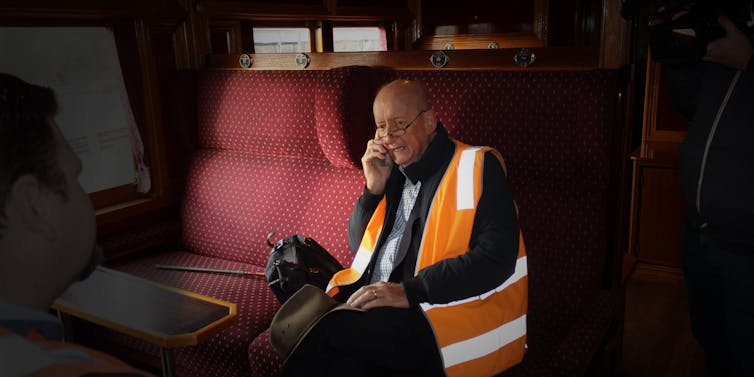
Sally Evans/ Albury Wodonga Regional Cancer Centre Trust Fund
Michelle Grattan, University of Canberra
Former deputy prime minister Tim Fischer, who has died aged 73 of cancer, leaves a political and personal legacy as a man of courage, conviction and congeniality.
The support that Fischer as National Party leader gave was crucial in John Howard’s success in achieving his ground-breaking gun control measure after the 1996 Port Arthur massacre.
While the issue tested Howard, for Fischer it was extraordinarily tough. Howard recalls: “He never tried to talk me out of it but he made it plain how difficult it was going to be in certain parts of the bush”.
Fischer remained resolute despite the fury of many among his party’s base, where hostility lingered for years.
When Fischer became leader in 1990, with the Coalition in opposition, quite a few observers doubted the party’s choice. (They included this writer; Fischer delighted in recalling that misjudgement.)
He defied the sceptics, managing his party and the Coalition relationship to the benefit of each, despite the challenges, which included not just gun control but the Wik issue, constant sniping from the Queensland part of the party, leadership rumblings, and the electoral threat posed by One Nation.
“The boy from Boree Creek” was born in the Riverina, and educated at Boree Creek Public School and then at Xavier College in Melbourne. He was conscripted in 1966 – subsequently saying his birthday being selected in the ballot proved a “great door opener” – and he served in Vietnam.
His long parliamentary career spanned state and federal politics. In 1971 he entered the NSW parliament; in 1984 he won the federal seat of Farrer.
Grahame Morris (who became Howard’s chief of staff) remembers as a young country reporter covering Fischer’s appearance at a hall in the town of Grong Grong, in his first state campaign. The speech seemed to take forever, because Fischer had a dreadful stutter – which in later years he managed to control, although it left him with an unusual speech pattern.
“That a fellow [who started] with a pronounced stutter became deputy prime minister and an effective communicator is remarkable,” says Morris, a friend of Fischer over decades.
Cabinet colleague Peter Reith said once, “You don’t so much listen to what Tim has to say as imbibe it”.
In the Howard government Fischer was trade minister, a powerful economic bastion for the National party in those days. But his time in office was limited. He stepped down from his party’s leadership (and the ministry) in 1999, largely driven by family factors – Harrison, one of his two young sons, had autism.
When he went to tell Howard of his decision, the PM tried to talk him out of it. Fischer, feeling he was losing the argument, played his winning card – revealing he had already told a journalist on a VIP flight from New Zealand earlier in the day. He left parliament in 2001.
The citation when Charles Sturt University awarded him an honorary doctorate in 2001 captured much about his personality: “Tim’s life has been about dogged adherence to goals. It has also been about risk-taking, grabbing opportunities and perseverance.”
The highlight of a busy post-politics career was serving as Australia’s first resident ambassador to the Holy See, a post to which he was appointed by Labor prime minister Kevin Rudd.
Among a myriad of interests and activities, including writing several books, Fischer’s special passion was trains, which saw him leading tours at home and abroad and, while at the Vatican, organising the Caritas Express, a steam train trip from the Pope’s platform to Orvieto in Umbria .
Last month Fischer was among those aboard a one-off passenger train, raising money for the Albury Wodonga Cancer Centre trust fund, that travelled to tiny Boree Creek, where a park was named for him. “It’s nice to be going home, on a special train,” he said.![]()
Michelle Grattan, Professorial Fellow, University of Canberra
This article is republished from The Conversation under a Creative Commons license. Read the original article.
